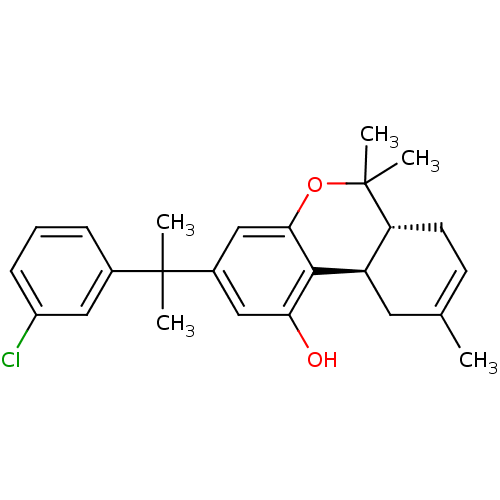BDBM50244357 (6aR,10aR)-3-(2-(3-chlorophenyl)propan-2-yl)-6,6,9-trimethyl-6a,7,10,10a-tetrahydro-6H-benzo[c]chromen-1-ol::3-[1-(3-Chloro-phenyl)-1-methyl-ethyl]-6,6,9-trimethyl-6a,7,10,10a-tetrahydro-6H-benzo[c]chromen-1-ol::CHEMBL521366
SMILES CC1=CC[C@@H]2[C@@H](C1)c1c(O)cc(cc1OC2(C)C)C(C)(C)c1cccc(Cl)c1
InChI Key InChIKey=SGEQUQLIALDVCQ-UHFFFAOYSA-N
Data 4 KI
Activity Spreadsheet -- Enzyme Inhibition Constant Data from BindingDB
 Found 4 hits for monomerid = 50244357
Found 4 hits for monomerid = 50244357
Affinity DataKi: 2.80nMAssay Description:Binding affinity to CB1 receptorMore data for this Ligand-Target Pair
Affinity DataKi: 2.80nMAssay Description:Displacement of [3H]CP-55940 from human CB1 receptor expressed in HEK293 cellsMore data for this Ligand-Target Pair
Affinity DataKi: 3.54nMAssay Description:Binding affinity to CB2 receptorMore data for this Ligand-Target Pair
Affinity DataKi: 3.54nMAssay Description:Displacement of [3H]CP-55940 from human CB2 receptor expressed in CHO-K1 cellsMore data for this Ligand-Target Pair
